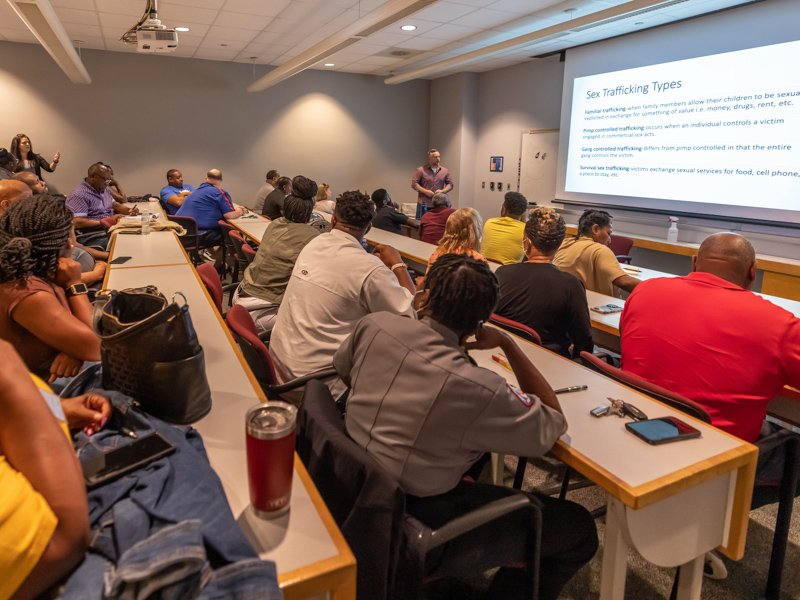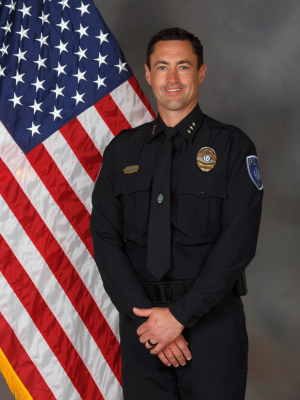UMMC police intervene, investigate for victimized patients

An ambulance brought an injured teen to the Emergency Department at the University of Mississippi Medical Center who had no identification, no parent or adult on hand and no clue on their date of birth.
An investigation by the UMMC Police and Public Safety Department revealed they were a forced labor victim, one of the two forms of adult and child human trafficking. The other: being sold for sex through force, fraud, enticement, coercion or other illegal means.

“In the recent cases, the nursing staff identified that something was off. They did the right thing. They called us,” said UMMC Police Deputy Chief Josh Bromen. “We were able to get the victims the resolution they needed.”
The Medical Center is being proactive in identifying potential victims by offering training and guidance to UMMC Police, with plans to extend it to clinical staff in coming months.
“You guys might see what we don’t see. You will be the first set of eyes,” Lt. Guy Collins, supervisory agent of the Mississippi Bureau of Investigation’s Special Victims Unit, told UMMC Police officers attending training on identifying and investigating human trafficking. Every member of the UMMC force received education last week from Collins and MBI’s SVU at the School for Health Related Professions.
UMMC is seeing human trafficking victims in the Emergency Department and on patient floors, Bromen said. “The key word here is human. They still need medical care. If the property is damaged, they (the perpetrators) have to get them fixed so that they can get them back out there working.”
When a possible victim comes to the Medical Center, two things need to happen: They should receive compassionate health care, and UMMC Police should be called so that they, and not hospital or clinic employees, can ask questions and investigate.
“It’s critical that they notify us so that we can get assets there,” Bromen said. “Human trafficking victims are seen as property by these perpetrators. We want to ensure their safety and that of our staff.”
Because of its location, agriculture and hospitality industries and interstate system, Mississippi is fertile ground for sex and labor human trafficking. Poverty presents constant opportunities for children and families across the state to become victims of trafficking by family members, the most prevalent type in Mississippi, according to MBI’s SVU.
“Mama just started a new job. Mama’s car broke down. Mama doesn’t have any money, but she has a 12-year-old girl,” said Special Agent Chaz Kennedy, a human trafficking investigator for the northern region of Mississippi. “Pizza for sex. A Nerf gun for sex. It’s that easy to manipulate a child.”
If a child like that is injured or sick and their traffickers take them to an emergency room, the facility’s security, law officers or caregivers might be the front lines. Although the age of consent in Mississippi is 16, a child under 18 being sold for commercial sex can’t legally consent. With juvenile sex trafficking, law enforcement doesn’t have to prove force, fraud or coercion.
“There is no such thing as child prostitution. They are being raped,” Kennedy said. “You have the backing of the state of Mississippi to hold that child until Child Protective Services arrives. You can act in the best interests of the child.”
“When they come through this door, we want them identified.”
Adults being commercially sold for sex or forced into labor also are common in the state, and law enforcement aggressively investigates and prosecutes, Collins said. Adults and children alike often deny they’re victims and protect their perpetrators, with fear, brainwashing or worries about having the basic necessities of life driving their distrust and inability to tell the truth. “Victims don’t call police for fear of being arrested or deported,” Kennedy said.
Law enforcement can tailor questions, voice and body language to be non-threatening and to gain trust when talking to victims, some of them beaten, burned or suffering infections or injuries from sex or sexually transmitted diseases.
MBI’s SVU advises looking for signs that include:
- Children having a significantly older boyfriend or girlfriend, lying about their age or giving inconsistent stories. Adults or children being trafficked might be wearing high-end clothing or be extremely loyal to their perpetrators. Sometimes, they are not U.S. residents.
- Victims with multiple cell phones, multiple social media accounts, or tattoos signifying they are “owned,” but not wanting to talk about them. “Most people are very open about their tattoos and what they mean to them,” Kennedy said.
- Injuries that are inexplicable or lend themselves to physical or sexual abuse, such as welts and scarring. They may appear malnourished due to the trafficker withholding food as a form of control. They may have bruising on legs or torso, or injuries caused by being grabbed by the throat or the face. Injuries may be consistent with what you might see in domestic violence cases.
- Children who may appear lethargic or “zoned out” after being forced to ingest substances such as chewable Benadryl, alcohol or drugs. They could have bite marks obviously made by an adult mouth, burns from cigarettes, or scarring from beatings with common household items such as a coat hanger. Both kids and adults might avoid eye contact and show fear, extreme submissive behavior, anxiety or depression.
Caregivers might notice that a victim is not being allowed to speak for themselves, or looking at the abuser or the person that brought them in before answering questions, Bromen said. “The caregivers have to trust their instincts. I’d much rather have a false alarm than a victim who comes through, and we don’t catch it,” Bromen said.
Collins and his team give this advice to law enforcement:
- If a victim has been accused of a crime – for example, stealing necessities from a discount store – don’t automatically treat them like criminals. “There’s a reason why they’re doing it,” Collins said.’ Attempt to find the reason behind the behavior.
- Be aware of body language – yours and theirs - and introduce yourself by first and last name. Don’t show dominance. Victims may have never experienced kindness and might react negatively to it.
- Don’t take anger or back-talk personally. Don’t lose your patience. Keep your demeanor calm and relaxed, and show interest in the victim and let them be heard.
- If possible, have a female officer available to interview a female victim. The victim may respond better to a female, but they could also respond better to a male. It’s important to have both available depending on the victim’s comfort level.
- Always try to get a possible victim connected with a victim’s advocate or at the very least make sure they have a good contact number for when they may choose to receive victim services. “We work with a survivor that had a number saved in her phone for two years before she was able and ready to reach out for help,” said Heather Collins, the state’s human trafficking intelligence analyst with MBI.
And, take the time to document interviews with victims and witnesses. “Be very detailed in writing these reports,” Kennedy said.
“Anyone who identifies a potential victim can call UMMC Police,” Bromen said. “Nobody has to kick this up their chain of command. If you suspect it, call police at 5-7777 and we will investigate. The reality is that it’s an emergency and possible security threat.”
It’s mandatory by law for anyone, not just law enforcement, with reasonable cause to suspect a minor is a trafficked person to report it to CPS through the child abuse hotline 1-800-222-8000 or www.mdcps.ms.gov. Law enforcement is required by state law to report human trafficking cases to the MBI at (601) 987-1671 or ReportHT@dps.ms.gov
For details or help, go to https://www.dps.ms.gov/humantrafficking/ The National Human Trafficking Hotline is 1-888-373-7888. Or, text 233733.


